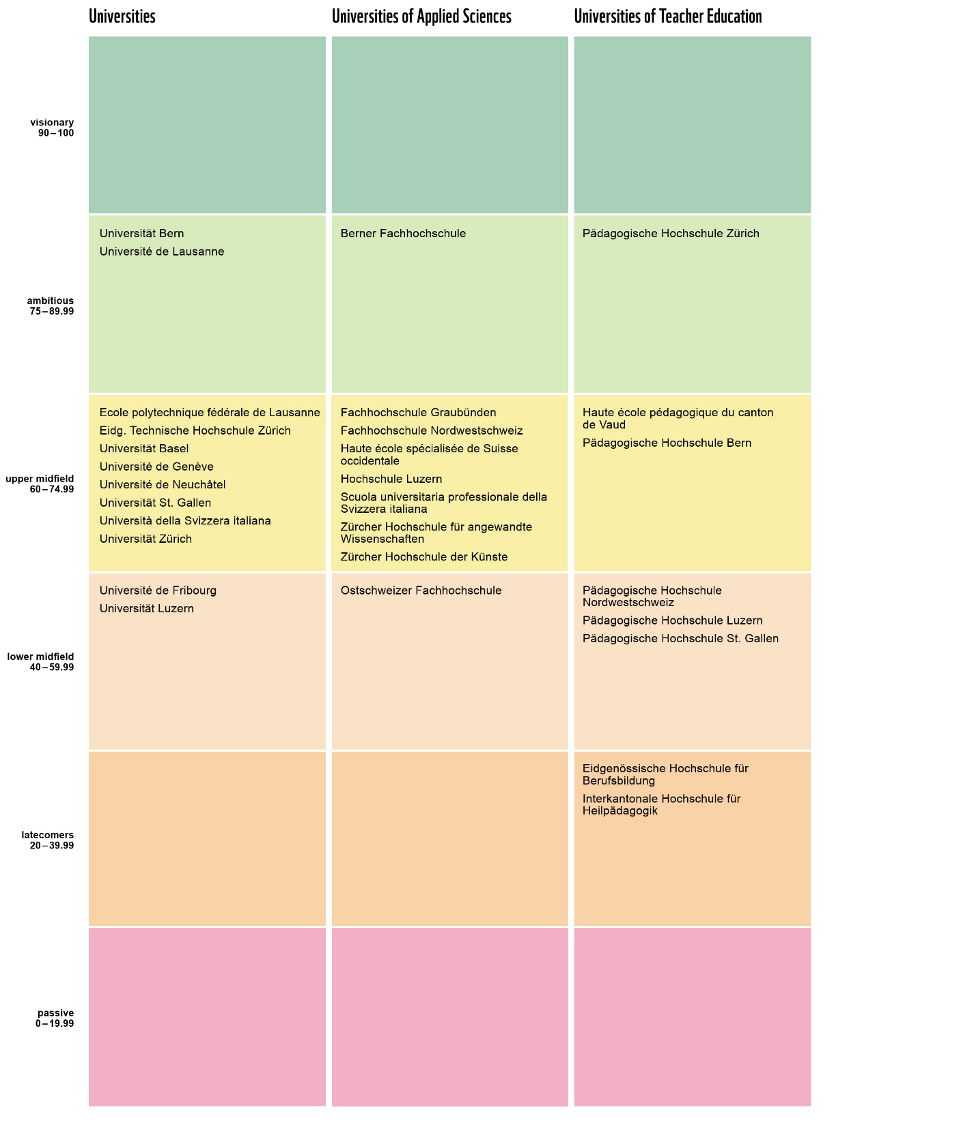
Advancing Sustainability in Swiss Higher Education
Universities are crucial for the transition to a sustainable society and economy. Through teaching, research, innovation in collaboration with external partners, policy advice, public communication, and by being role models themselves, they can contribute significantly to sustainability. To do this, universities (UNI and ETH), universities of applied sciences (UAS), and teacher education institutions (UTE) must transform themselves towards sustainability in all areas.
Sustainability Rating of Swiss Universities
«To truly lead in sustainability, universities must ambitiously and thoroughly implement their strategies, embedding sustainability into every aspect of their operations, with a strong emphasis on teaching.»

The 2024 Sustainability Rating shows that all 29 assessed universities have made important progress in sustainability, regardless of their type. 17 out of 29 institutions are in the upper middle range, indicating that the majority is on the path to integrating sustainability. However, no "visionary" universities can yet be found in Switzerland. Most institutions have developed strategies and guidelines and established committees and specialist units to promote sustainable development. Nevertheless, almost all institutions still have significant room for improvement, particularly in teaching: Advancing ESD approaches, providing support for lecturers in integrating ESD, involving students in curriculum development, and ensuring that all students have a foundation in sustainability literacy would better equip them to face future sustainability challenges.

Sustainability Rating 2024: The graphic provides an overview of where Swiss universities, universities of applied sciences, and teacher education universities stand in 2024 on their path to becoming a "visionary sustainable university."
WWF-Manifesto for Sustainable Universities
The visionary, sustainable Swiss University is a pioneer that embodies holistic and contemporary approaches to sustainability in its five core areas. It is not just a place of learning but a living system in which the principles of sustainability flow into every action, decision, and interaction.
Conference Documentation
On September 1, 2023, 211 lecturers, university staff, students, and NGO representatives attended the "Teaching and Learning for Change: Sustainability in Higher Education" conference in Bern. Recordings of the keynotes, the panel discussion, as well as presentations, workshop results, and marketplace posters are available on the website.
Education Policy
The development of sustainable socio-economic and socio-technical systems and lifestyles requires individual and societal learning processes. The necessary knowledge, understanding, and sustainability-related competencies can be promoted both within and outside educational institutions. Therefore, we advocate for strong, future-oriented education at all levels — formal, informal, and non-formal — and for all. Together with the NGO Education Coalition, we are strongly dedicated to advancing Education for Sustainable Development (ESD) as a cornerstone for fostering a sustainable future and cultivating a society that thrives in balance with nature.
What you can do
Support our educational policy efforts by becoming a WWF member. With your contribution, we can further promote sustainability at Swiss universities. You can also calculate your ecological footprint and find out how to make your everyday life more sustainable.
Your contact at WWF Switzerland
Newsletter – Sustainability in Higher Education
Our newsletter covers topics related to Sustainable Higher Education. The content will involve book recommendations, event invitations, news on projects, success stories / fails, networking opportunities and calls to action. Please sign up here.

